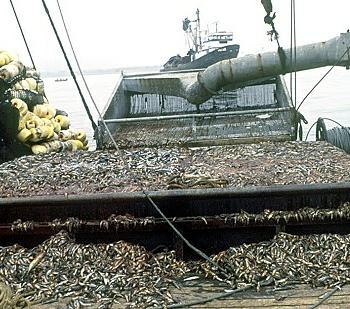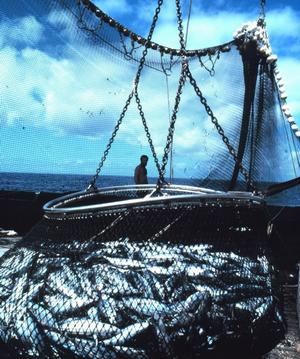 遏止漁撈過度的努力總算取得成果,意味著只要願意嘗試的話,即可實現魚類族群復育的夢想。
遏止漁撈過度的努力總算取得成果,意味著只要願意嘗試的話,即可實現魚類族群復育的夢想。
由國際科學家組成的團隊,針對全球10大海洋生態系的魚類族群和漁業發展趨勢所進行的一項研究發現,魚類存量在其中5個密集式管理的區域裏呈現上升的跡象。
刊登在7月31日出版的「科學」期刊中歷時兩年的研究,是由位於哈利法克斯市戴爾戶斯(Dalhousie)大學的沃門(Boris Worm)和位於西雅圖華盛頓大學的西爾伯恩帶領(Ray Hilborn)外加一個由來自各國的19位合著者組成的團隊所共同撰寫的。
科學家們對全球各個沿海國家的1,188位漁業專家進行訪查,從中瞭解漁業管理效率的相關信息,再將其結果與可維持永續性的提報漁獲量指標匯集整合起來。
文中寫道,「我們得到的結果顯示,全球各地政府所實行的漁業管理政策與致力降低過度捕撈效應的國際準則相距甚遠。」
作者還指出,「我們的研究還表明,姑且不管漁業本身的其他屬性,透過參與性和透明的程序將具有科學根據的建言轉化為政策,可謂是實現永續漁業發展的核心。」並稱,「該研究結果的確點明了參與性、透明、以科學為基礎的管理方式的益處,同時也突顯了全球漁業脆弱之處。」
 儘管復育有望,該研究報告提出警告表示,許多地區仍因過度捕撈而處於漁業崩潰的邊緣,經評估過的魚類存量中就有63%的族群需要人爲的介入以協助其脫離困境。
儘管復育有望,該研究報告提出警告表示,許多地區仍因過度捕撈而處於漁業崩潰的邊緣,經評估過的魚類存量中就有63%的族群需要人爲的介入以協助其脫離困境。
截至目前爲止,大多數漁業呈現改善的地區是由富有的工業化國家如美國、冰島、紐西蘭所管理,效果最爲成功。
而發展中國家肯亞是唯一的例外。野生動物保育協會(Wildlife Conservation Society)長期在當地進行漁業研究。該協會建議當地管理人員和社區關閉某些重要的捕撈區,並限制特定類型漁具的使用。一連串的努力最終使得魚群的身型與價格一併上揚,並增加了漁民的收入。
該研究結果或許是個見人見智的問題,但如果及時運用適當的管理,其結果即足以點燃沃門對魚類復育的希望。
沃門進一步解釋,復育的關鍵在於靈活運用各種各樣的解決方案 -- 減少漁獲、禁止特定區域内捕撈、規範漁具的使用、減化捕魚船隊的捕撈設備等。而因地制宜才是解決之道。
Efforts to curb overfishing have begun to succeed, bringing hope that fish populations can rebuild if given a chance.
A new study by an international team of scientists examined global fish populations and fishing trends in 10 large marine ecosystems and found that in five of the areas where intensive management is taking place, fish stocks are beginning to rebuild.
The two-year study, published in today's issue of the journal "Science," was led by Boris Worm of Dalhousie University in Halifax and Ray Hilborn of the University of Washington in Seattle, along with an international team of 19 co-authors.
The scientists surveyed 1,188 fisheries experts from every coastal country in the world for information about the effectiveness with which fisheries are being managed, and related those results to an index of the probable sustainability of reported catches.
"We show that the management of fisheries worldwide is lagging far behind international guidelines recommended to minimize the effects of overexploitation," the authors write.
"Our study also shows that the conversion of scientific advice into policy, through a participatory and transparent process, is at the core of achieving fisheries sustainability, regardless of other attributes of the fisheries," the authors state, adding, "These results illustrate the benefits of participatory, transparent, and science-based management while highlighting the great vulnerability of the world's fisheries services."
While there is hope for rebuilding, the study warns that many areas are still suffering from collapse of fisheries as a result of overfishing with some 63 percent of assessed fish stocks in need of help.
Most of the fisheries that showed improvement are managed by wealthy industrialized nations with the United States, Iceland, and New Zealand showing the most success.
An exception is the developing nation of Kenya, where the Wildlife Conservation Society conducts long term fisheries research. WCS has advised local managers and communities to close some key areas to fishing and restrict certain types of gear. This has led to an increase in the size and prices of fish available, and an increase in fishers' incomes.
While it may seem like a glass half-empty or half-full debate, the findings give Dr. Worm a renewed hope that if proper, timely management is applied, fish stocks can be rebuilt.
Dr. Worm explains that the key to recovery lies in a diversity of solutions - reducing catches, closing certain areas, regulating fishing gear and reducing the capacity of fishing fleets, and each area will have to do things specific to that ecosystem.




